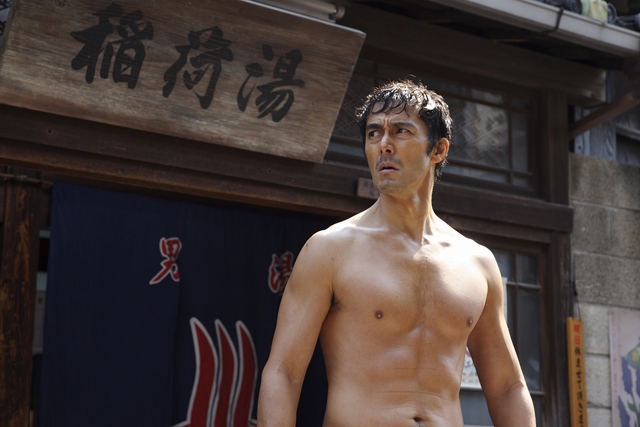Thermae Romae: Written by Shogo Muto, directed by Hideki
Takeuchi. Starring: Hiroshi Abe, Aya Ueto, Masahika Ishimura, and Kazuki
Kitamura. Running Time: 108 minutes.
Based on the manga by Mari Yamazaki.
Rating: 2.5/4 Stars
Hiroshi
Abe is a Roman architect, specializing in bathhouses, crucial social gathering
places in ancient Rome. However, he
feels outstripped by the new, more garish designs gaining popularity. This, he fears, is ruining Romans' traditional reverence for bathing and the myriad ways it can both cleanse and heal. On top of that, his wife is dissatisfied with
him (and eventually leaves him), and the person he loves and respects more than
any other, the Emperor Hadrianus, is slowly being weighed down by a frustrating
war on the border and concerns over who his successor will be.
While
visiting a competitor’s bath to think up a plan, Hiroshi finds himself sucked
into a crack at the bottom of the bath.
Said crack is apparently a leftover rift in the space-time continuum
from Doctor Who, as he suddenly finds himself in a bathhouse in modern-day
Japan. Obviously, he doesn’t realize
this at first, and believes that he is simply in the bathhouse of a provincial
ethnic group being used as servants (his references to the modern-day Japanese
as “slaves” and “The Flat-Faced Clan” are a running gag throughout the entirety
of the film). However, as an experienced
cultural architect, he quickly realizes he’s in a land far more advanced than
Rome, as well as one with far more reverence for bathing, which often leaves
him despondent and depressed.
He
pushes his worries aside, however, and uses his skills as an engineer to
replicate what he sees in Japan upon his return to Rome- over a series of trips
to and from Japan (through ever-more inventive means of tossing him into water),
he figures out how to replicate bubbles, clothing baskets, wash buckets, hoses,
private bathtubs, toilets, and even mini-aquariums, all of which cause his popularity
in Rome to skyrocket. However, things
get complicated when a young Japanese woman (Aya Ueto), whom he keeps running
into when he travels to the 21st century, accidentally gets sucked
back to Rome with him, along with a gang of old men who apparently spend all of
their time bathing at the hotel owned by Aya’s family. Hiroshi and his time-traveling friends must
figure out together how to stop Hadrianus’ womanizing son from succeeding the
throne, how to revitalize the soldiers losing the war on the front, and how to
get Aya and her friends back home, while still making it back in time for
supper.
This is
a fun movie. The fish-out-of-water
scenarios in the first two parts of the film are very well-done- Hiroshi’s stoic,
un-ironic seriousness in the face of modern-day technology gets a lot of laughs
(his best reaction might be his discovery of a toilet’s butt-washing device-
no, I’m not kidding, that exists). He
does a fine acting job here, and the gaggle of old “real” Japanese are a lot of
fun (the other Roman characters never left an impression on me). The time-travel mechanism remains blissfully
unexplained- this is not sci-fi, so any attempt to rationalize Hiroshi’s journeys
would simply bog down a story that’s too flimsy to handle such scrutiny. Suffice it to say that I wouldn’t be
surprised if Hiroshi’s character went on to develop a severe case of aquaphobia. The subplots that
revolve around ancient Rome as a setting are cute, and move the story along
well enough, but they ultimately serve little purpose other than to say to the
audience, “Look! Romans and
Japanese! They both really, really like
taking baths!”
It’s
possible that Thermae Romae is a film
that would be funniest to either Japanese people themselves or to people
intimately familiar with Japanese society, but although my knowledge of
Japanese culture is relatively limited, I got all the bathing jokes and laughed
plenty. It never reaches the subtle,
witty brilliance of Key of Life, but
there’s some great bits of comedy here (my favorites are the shots of a
European tenor belting out an aria during the time-travel sequences). The film tries a bit too hard to be seriously
“about” something towards the end, which feels a bit too disconnected from the
tone in the first two-thirds of the film, but it does keep up the good humor
long enough that it doesn’t really matter.
Not a must-see by any stretch, but if you do get the chance to watch it,
you won’t leave unhappy.
-Noah Franc

No comments:
Post a Comment